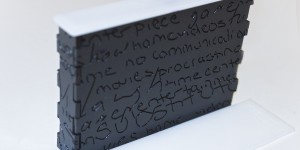Imaginary Habitats: “Place, Relation, and Mind” by Alysia Finger (2013)
As I set out to create a story about an imaginary habitat, I wanted to focus on the idea that inhabitants are what make a habitat more than just a place. I relied on my own home environment to draw inspiration for representations of habitats and inhabitants. I focused on how people can occupy the same space in such different contexts. How do people choose to interact with a place? At the same time? At different times? While co-inhabiting, what are there relations with that space and with each other? How do they feel about a space and the objects in that space? What do they associate with those things? How do the meanings of those spaces and objects differ between people?
The pieces are made from 1/16″ black and white acrylic.
Using a pristine, white overview of my apartment’s layout to establish space and relation of objects to each other, I set the ground for a narrative to be created by the people who interact with that space. I begin by dripping purple acrylic paint over the scene, mapping out how I perceive my boyfriend to move through the space and I strategically draw attention to the objects he spends the most time with, especially when he’s not interacting with me. My boyfriend similarly routed where he perceived me to spend most time, using pink acrylic paint. In the end, it became obvious that (in my mind) he spends most of his time in the corner (at his desk) or on the right side of the bed. (In his mind) I spend most of my time in another room (on the couch) or on the left side of the bed. We use the kitchen and table spaces very rarely.
The next portion of my project details our more personal associations with the objects in our apartment. For each item, my boyfriend and I wrote words that came to mind when interact with it. I scanned those words in, and vectorized them in order to engrave them on the base pieces of the furniture. Words like “privacy” appear on things like our shower. My boyfriend associates his desk with simple themes such as “computer” or “internet,” while I perceive the space with words like “neglect” or “mindless” because of the amount of time he wastes there without interacting with me.









